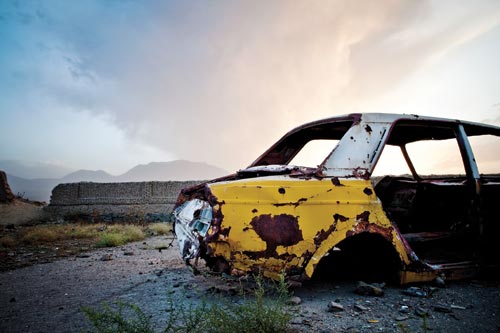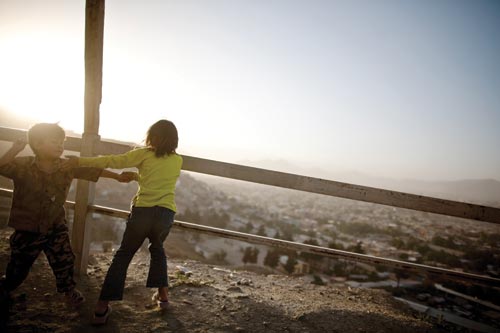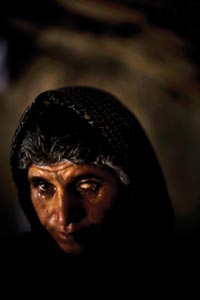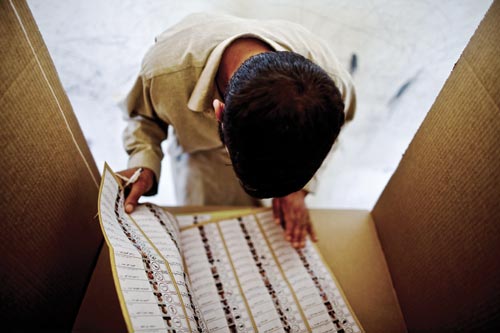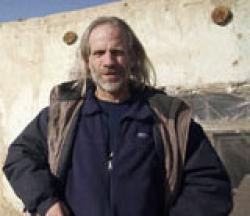On the eve of Afghanistan’s historic election, nothing seemed apt to change.
You know how it is.
You can’t run off to every bombing even with a presidential election just days away.
When I started here in 2001, I could chase them down because traffic didn’t exist, and there wasn’t a police force to seal off the area. I could walk through debris and bodies without question and watch other reporters pose in the shattered remains of cars as colleagues snapped their pictures.
Today, Kabul is a chaotic city of three million mostly impoverished people, but it only has enough housing and roads for half that number. With so much congestion, what was once a thirty-minute drive can now take as long as two hours. By the time you arrive, the fledgling Afghan police force and US military and international security forces will have sealed off the area so tightly that all you will see is yellow tape, maybe a charred car, and some dazed people who don’t know much other than that one minute they were walking and in the next the air heaved and tore at their bodies and then threw them to the ground.
No, the place to go is Akbar Khan Hospital, where the injured are taken. There, in an effort to rally international support against the Taliban insurgency, doctors will allow you to walk among the maimed and injured and snap photos and take notes and then leave. The people you see will be one more example of a tottering government that can no longer provide security as it engages in a presidential election that is just so much background noise to the real noise of bombs going off. In time, all this won’t bother you like it used to. No shock, no despair, nothing. Only fear. Sometimes fear can lift the coma.
So I sit this morning in a hotel lobby drinking lukewarm Nescafé with a Dutch news photographer and watching the BBC when another bomb explodes. I feel it more than hear it. That little ripple beneath the floor, the air vibrating as the walls absorb the wave of a far-off blast that somehow has reached us. We both stand and look out a window but see nothing other than a few frantic policemen pointing and shouting in opposite directions and looking into the sky.
We sit back down. By now, we know the drill. I check my watch. In an hour, we’ll head to the hospital. The photographer nods in agreement.
“You know what, mate?” he says. “If we don’t care, nobody cares.”
-
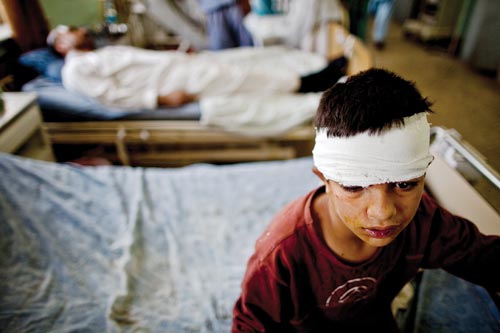
- A twelve-year-old boy at Akbar Khan Hospital recovers from wounds suffered in the suicide bombing near ISAF headquarters. (Rafal Gerszak / Aurora Photos)
Mohammad Heider stands outside Akbar Khan Hospital. Both his calves and both his hands are wrapped in bandages. Small scratches scar his bearded face. Beside him on the cracked steps, a man sits in a wheelchair, his left foot wrapped in a cast and thrust straight out into the air like a thick tree limb. Blood stains the heel of his cast and drips onto the damp pavement. Women wail at the bottom of the steps leading into the hospital. On blankets, men sip tea and wait for word of a family member injured in the bombing.
A taxi pulls up and three men struggle to lift the man from his wheelchair into the back seat. Once they get him inside, the women seat themselves in the open bed of the truck while the three men squeeze into the cab beside the injured man.
Heider watches the cab leave and waits for his own family to pick him up. This day, August 15, he was walking close to the headquarters of the International Security Assistance Force (ISAF) when a sudden shock wave tossed him toward the sky. He landed on his left side and thought, I can’t move. Shards of glass rained hard on the pavement. His ears buzzed. When he opened his eyes, people, chiseled with cuts, lay all around him. His feet bled. He crawled over glass to a doorway. A man picked him up and carried him to a car. The sound still roared in his ears. Three other bleeding people sat slumped to one side in the backseat. All the roads were blocked and, despite his bleeding passengers, the driver had to show his identification to dozens of panicked police to get through the checkpoints.
At the hospital, the doctor worked very fast. He washed Heider’s legs and hands, bandaged them and told him to come back in three days to have shrapnel removed. He had to walk out on his own and borrowed another patient’s mobile phone to call his son. Three hours after the explosion he stands here still waiting for his ride. He feels better, but the pain in his feet racks his body with tremors.
He looks at his hands, blood already staining the fresh bandages. The doctor told him to change these dressings daily. He wonders where he will get the money for new bandages. Can I give it to him?
Until now, he had not decided whether or not he would vote in the presidential election. Now he knows: He will not. It will hurt too much to walk to the polling station near his home. Why put himself through that for corrupt men? If you don’t take a bribe as a government official, Karzai won’t give you anything. You must be dishonest. No matter who wins. That’s how it is. Nothing changes, he says—except his life will never be the same after today.
-
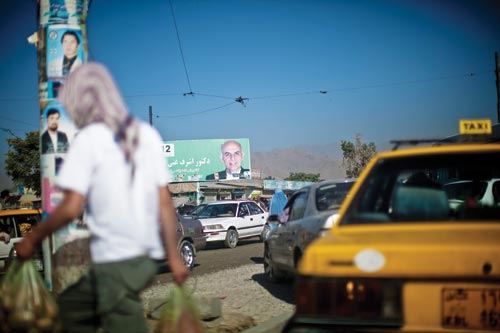
- A campaign sign for bald-headed presidential candidate Ashraf Ghani. (Rafal Gerszak / Aurora Photos)
Driving back to the hotel, my interpreter jokes with other Afghans stuck in traffic about the campaign billboards scattered throughout Kabul. They compose slogans to go with the posed candidates.
For Karzai, the favored candidate, shaking his fist: Vote for Me, or I Will Box You.
For smiling Abdullah Abdullah: Vote for Me, My Taliban Brothers, and You Can Keep the South.
For bald Ashraf Ghani, running a distant third: Vote for Me, So I Can Afford a Hat to Cover My Head.
Karzai is the butt of the most jokes. My translator especially enjoys the story about tribal leaders in a rural province who were tired of all the corruption. A small group of them journeyed to Kabul and requested a meeting with Karzai. He gave them five minutes.
“Mr. President,” the lead elder pleaded, “you must stop all the corruption in our province.”
“I will be happy to,” Karzai told them. “But first how much will you pay me?”
The young man introduces himself as nineteen-year-old Shakib Ayubi, a former interpreter who served eighteen months with the US Army in Kandahar. He sits across the table from me at my hotel, a waif of a man with nervous fingers. Shakib left the army two weeks ago because his mother was ill. He had asked for an emergency leave but was told that it would not be possible, so he resigned. Now he will reapply. The army needs translators and he needs money. Most jobs in Kabul don’t pay as well. Banks maybe, but what does he know of accounting? Nothing. But he can speak English.
“I fear going back but I have to feed my family.”
Shakib dismisses the election as unnecessary. It won’t help, he says. Afghanistan cannot be peaceful. Especially in Kandahar—the most dangerous, most unmerciful area of the country. Always bomb blasts—morning, noon, and night. Some districts are getting worse. Especially farther out from the city. The people in Kandahar City may vote, but outside? No. Too many areas are not controlled by the government.
“Have you been there?”
“In 2003,” I tell him.
He waves his hand, erasing my words from the air as if they were flies. Six years ago. Too long.
“Listen,” he says, leaning forward. “Women, even men won’t take part. They will be threatened if they take part. They’ll be seen as part of the government and then killed.”
He talks very earnestly and does not blink. His fingers dance against his teacup. The waiter at a nearby table tells a guest that dinner will be kebab and rice, but that he will have to wait because the cook is asleep. Shakib stares directly into my eyes, oblivious to the rising anger of the hungry guest.
“Once we were in a convoy,” he says. “Eight roadside bombs exploded. Five Americans were injured and one Afghan with the National Army. They used a clever procedure when they planted the IEDs. They lurked nearby, hiding. The IEDs exploded and they opened fire so no one could get out of their vehicle. They cooked inside . . . like kebab.”
Shakib looks out the window. A new hospital has been built across the street where vendor stalls and kebab shops once stood. That was also in 2003, when a new hospital was not needed and you could go out alone at night unafraid.
Shakib was so scared in his first firefight that he has trouble describing it. He told his commander that he quit. “Not now,” the commander said above the gunfire. “When we’re back at base you can quit.” Dust clouded his vision. Explosions pounded against his chest like punches. His ears filled with angry sounds. Gunfire popping everywhere.
That night Shakib slept fitfully. In his dreams, he decided to remain with the army. For the money. Six hundred a month. His dreams included military strategizing. He concluded that without aircraft it would be impossible to beat the Taliban. In the mountains they could not be found with mortars. He awoke exhausted.
“Now I am used to IEDs. My parents tell me, ‘Don’t go back.’ But it’s my job. I have to do it. If I don’t go back I can’t feel peace. I’ll have no work.”
He finishes his tea and the waiter offers more, but Shakib wants to leave. The waiter is very solicitous. You come to a place like Kabul often enough, you start to seek out small comforts, trappings of the familiar. I like this hotel, and the waiter remembers me from previous trips. He flatters anyone he sees me with. He’s just hoping for a big tip—and you can’t blame him—but, interrupted, Shakib can’t muster the energy to start again.
“No more tea, thank you,” he says, and stands to leave.
“Will you vote?” I ask him.
He studies me for a moment, as if I haven’t heard a thing he has told me. But if you come to Kabul days before the election, you’re expected to ask stupid questions.
“There are Afghan people who think they are still fighting the Russians,” he says with a sigh. “They stay in their villages, never come to the cities, and don’t know time is passing. One day, on patrol. I heard a soldier’s radio pick up a Talib saying, ‘Red guys coming in force.’ Red like Communists, you see? They don’t let us explain we are not Russians. They open fire. There’s no opportunity to understand one another. How can you vote in a country like that?”
Margie Cook with the United Nations Development Programme has no time for Shakib’s concerns about the election.
“This time,” she says with confidence, “the election is being run by Afghans.”
The UN has sunk $100 million into voter registration and will spend an additional $225 million to cover all costs of the election, including a runoff if none of the candidates receive fifty percent of the vote.
“The criteria should be tougher, some people say, to reduce the number of eligible candidates,” Cook continues. “But without political parties, a country tends to have many independent candidates. If politics here was more of a party-based system, there’d be fewer. Will come in time.”
She sits behind a desk with a computer in a second-floor room of a three-story house. Another large office stands across the carpeted hall. Men move back and forth holding stacks of papers on the election process. The air-conditioning makes Cook’s bare feet cold and she turns it down.
“No one denies bad things are happening,” she continues. “It’s a new process. Afghanistan has been bedeviled by war for thirty years. This remains a culture where women can’t participate in anything as easily as men can. I know this.”
The problems, however, extend beyond the ongoing plight of Afghan women. The Free & Fair Election Foundation of Afghanistan found instances of underage voter registration, negligence of Afghan electoral staff, and insufficient security to protect polling stations, especially in the south, to name but a few irregularities documented in a fifty-page report.
Cook remains upbeat.
“The voter registration process is on its way to being viable—but not this year, I know. Procedures are in place to ensure people only vote once.”
She raises her hands to show her fingernails painted with the indelible ink voters will have to stick a finger into when they vote to prevent them from voting twice. Weeks, she said, were spent devising the right ink. She leans backward and squints, examining her hands as if they were pieces of fine art.
“Are there areas of the country where people won’t be able to participate and may never be able to participate because they are under Taliban control? Yes. No surprises in this. The process is Afghan led.”
In the morning, several hotel guests and I have to vacate our rooms. Karzai is going to make a campaign stop at the new hospital across the street and all facing rooms must be searched. His security detail breaks the locks on doors, feels the beds, checks the chests of drawers. They stand in the middle of someone else’s life, not sure what else to do other than tear it apart. Once satisfied, they stand in the halls with their guns to keep anyone from returning, while they wait for Karzai and order tea.
I sit with a burly US Army contractor in the TV room. He had been a commercial fisherman in Puget Sound, but then a buddy in Kuwait suggested he come over and make some real money. He sells air-conditioning units to the military and calls everyone “Dude”—even a woman from Montana who says she is in Kabul to teach American kids about Afghanistan via the internet. He has so influenced all of the guests at the hotel (journos, contractors, and aid workers alike) that we all call him “Dude,” too.
Behind us a Zimbabwean gunsmith is playing pool. He calls himself the best gunsmith in Afghanistan but complains that he can’t find work in a country that has been at war for thirty years.
“Hey, dude,” the gunsmith says.
“What’s going on, dude?” the contractor responds.
A bomb interrupts them.
East of our hotel this time, from the sound of it. No one can see smoke or anything. Again, too far away. But some newbie photographers run outside to chase it. They’ll learn. I check my watch. Give it an hour, then back to the hospital.
A former minister of planning, a member of parliament, and a scholar of law and political science, Ramazan Bashardost is one of the forty-one candidates running for president. He lives in a tent across from the parliament building. He lags far behind the front-runners but is not discouraged.
“My tent means I am of the people,” he says from his office behind the tent, a square block of concrete equipped with a desk as well as a generator and fan plugged into wires hanging from the ceiling. “As minister of planning, I gave back my salary. The people say of me, ‘He can live in a tent and give back his salary because he is not corrupt.’ I am accessible and can speak directly to them.”
Although the sun has barely risen, people have begun gathering in his tent. They walk across the bare ground in sandals, wrapped in prayer shawls. Dogs hover in the distance watching vendors setting up their stalls, donkeys packed with supplies.
“I want to be president because it is a good life,” Bashardost says and then laughs. He holds two fingers to his lips as if he has a cigarette and sighs—a gesture of mock opulence. “Seriously, I want Afghan politics to be clean. I fought corruption when I was minister. I want the next president to believe in the values of human rights and to have the support of all ethnic people. I have the support of the nation.”
Just the opposite is true. He runs about fifth in national polls. Yet, his tent has garnered attention and attention has fed his visions of greatness to come.
“Karzai does not believe in good governance, in human rights. His philosophy is a tribal vision. He never decided to fight corruption. For him corruption is part of life, part of a tribal vision. Your brother kills an innocent man, you support your brother, your tribe. It is a mafia system. I will make a clean state without warlords. We cannot have peace and govern with criminals. We need an independent president.”
He stands, brushes dust off his clothes. It is time for him to hold court in his tent.
“Unlike Karzai, I never receive threats. I go into all areas without bodyguards, even Kandahar. All the people say you are welcome.”
Not everyone agrees.
“He is twenty percent lying,” a vendor says as he arranges soft drinks and snacks in his stall. He watches Bashardost enter his tent. “He can go without bodyguards because people are not interested. They know he won’t be president. If he had forty percent support, he would have bodyguards. How does he travel if he gives his money back to the government? His campaign posters must cost at least one dollar each. That is not just from donations. He is taking money from the government. So, no, he is lying at least thirty percent.”
-
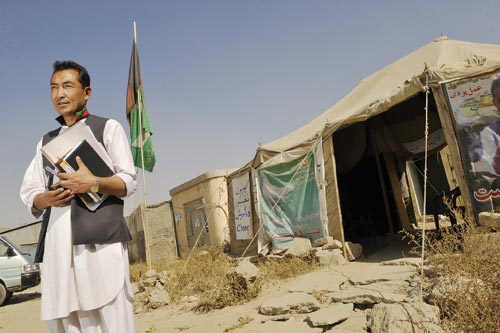
- Ramazan Bashardost stands in front of the tent that serves as his headquarters across from the Afghan parliament in Kabul. (Rafal Gerszak / Aurora Photos)
Remember this: a trip to Kandahar, the birthplace of the Taliban, must be planned carefully. Only one guesthouse is safe for Westerners. It is, of course, watched by the Taliban. As a Westerner, you must change your schedule daily while you are there. Avoid routine. Stay three, four days at most.
A translator and fixer will ask for $150 apiece or more per day. If neither has a car, you will have to pay for that as well. You don’t bargain down the price. They will keep you safe, alive. Don’t go cheap.
“Yes, yes,” a translator says over the phone from Kandahar. “I can work for you.”
He has been recommended to me by a Wall Street Journal reporter.
“How will I know you?” I ask.
“I will know you.”
He hangs up. I call back.
“It is not safe to plan on the phone,” he says and hangs up.
I stand alone on the balcony of the hotel. If a man approaches you in the Kandahar airport and says he is the voice on the phone, do you believe him?
The other day I took a taxi, though the hotel manager had warned only to ride in private cabs. I was in a hurry. The driver sang to himself. As he drove, I realized I didn’t know Kabul well enough to know if he was taking me to the address I gave him or not. The driver kept singing. His yellow cab was old and dented, no company insignia. I began to think what kind of prize I might be for a poor man. I looked out the window. I knew I’d been that way before but nothing looked familiar. Who would pay for you if you were kidnapped? My heart raced and I told him to stop. He looked at me confused. I slapped a wad of Afs into his hands and got out and walked back to the hotel through the crowded bazaar. I shouldn’t have been there either. I felt the stares of everyone.
“Hey dude, you want some melon?”
The Army contractor has joined me on the balcony. He holds out a plate of sliced watermelon. I glance at my cell phone.
“In a minute.”
I dial the number again. It rings a long time. No one answers.
Would you be scared? Would you still board your flight?
Remember: you’re a reporter. You should fly to Kandahar and report on the campaign from there, but would you? Or would you stay in Kabul and eat melon, tasting your shame in each bite?
Michelle Bayat Secondary School in south Kabul serves fifty to sixty children who have lost parents to war since the US-led invasion in 2001. None of the presidential candidates have visited the school. Campaign posters hang from lampposts outside the long tree-lined drive that leads to the main building. Water gurgles in streams and birds sing in the shade. A great photo op. What American politician would pass it up? But still the candidates don’t come.
The children are not happy, explains the general director of the school, Ali Mohammad. Their mothers were pregnant during the war. When they were born, they saw shelling, rockets—and now they never smile. “Even my daughter,” he says. “Her first word was ‘bomb.’”
A teacher beside him objects.
“I am like the students’ mother, like their father. I never let them think about the war. I keep them so happy.”
His voice fades beneath the noise of a Chinook helicopter flying low overhead. When it passes, the echo of its propellers still ringing through the air, Mohammad continues where he left off, raising a hand to silence the teacher.
“Westerners train animals for the circus,” he says. “Because of good food, land, and teachers, they have the time to even teach animals. From the beginning of life here, our children are very sad. They can’t forget all the things that happened before.”
He pauses, opens the door to his office and ushers in some children. You will see this from time to time. A well-orchestrated show, put on especially for your benefit.
Eight-year-old Maryam: “My father is dead. I was very young. I don’t know how he died. I was told he died during a bombing in 2005 on the other side of Kabul. No, I don’t know where. I remember him as thin. He would take me to the bazaar and buy gum. Balloons. Sometimes I think of him. When I dream, I see my father and I am happy. I wake up sad. He takes me to the bazaar in my dreams.”
Nine-year-old Habib Ullah: “I lost my father during the Taliban time in Logar. There was fighting between the government and Talib. My father was taking me to the bazaar. He was shot and the bullet hit my left foot. My mother and sister carried me to the house. My father died in the bazaar. He would play soccer with me. He liked to buy fruit too. Stocky. I don’t remember anything else. I forgot. It’s been too long for me to remember him more.”
Ten-year-old Ahmad Martin: “My father was killed in 2001. I was two years old. He was a farmer. He was in a field and a bomb hit him. I don’t know if it was from the Americans or the Taliban. He had a big beard. I try to forget about his death.”
What can you say? Ahmad holds a wrinkled color photograph of a heavyset, bearded man with two children on his lap. The man wears a brown jacket and a red vest and sits stiffly before a backdrop of a painted forest. A studio photo. He appears very solemn but the children are smiling and he grips them with his big arms as if he will never let them go.
“He died,” Ahmad says. “He just died.”
-
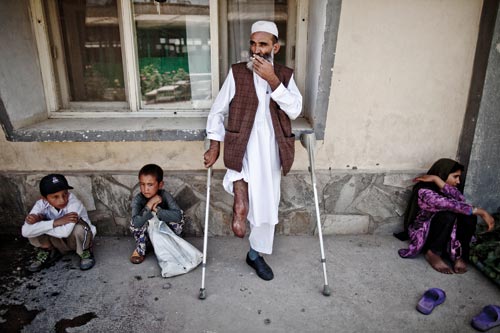
- An Afghan man, who lost his leg after stepping on a mine, waits to get fitted for his prosthetic leg at the Red Cross Orthopedic Center. (Rafal Gerszak / Aurora Photos)
You could spend all day at preselected interviews, press conferences, and carefully plotted bits of political theater. The major campaigns—Karzai, Abdullah, and Ghani—all call to inform you of their events.
Women announcing their support for Karzai at 2 P.M.
Abdullah to speak at the Intercontinental Hotel at 8 A.M.
Ghani to make an announcement at his campaign headquarters at 5 P.M.
Most of these are mere photo ops. Advertising posing as news. Nothing will be said that hasn’t been said before. How many Americans will really care about this? Your editor will want to know.
The aides to the presidential candidates call and call and tell you again and again about a particular event.
“I know, you already called me,” I tell them.
Still they call. And keep calling. And calling.
“It means no one has shown up,” my translator explains.
The doctors at the Kabul-based International Committee of the Red Cross Orthopedic Center see at least two patients a day who have lost a leg to IEDs. It takes about five to seven days for patients to get accustomed to a prosthetic limb if they were amputated below the knee. Above the knee, one week to ten days.
Most days, men and some women with missing limbs fill the center’s compound waiting for a doctor. Their stumps tap the air, crossed over the knee of their good leg.
In an exercise room, a teenager stands between parallel bars balancing on his right leg while a physical therapist adjusts the prosthetic limb on his left. He lost his leg when he stepped on a mine walking home from school in Nangarhar Province.
“Feels tight,” he says.
“Now?” asks Sayed Musa, the physical therapist.
“A little pain.”
“Let’s try it again.”
Musa’s own left leg was blown off in Kandahar in 1988. He was a soldier on patrol near a Chinese-run hospital. November. The weather not too cold. He stepped on a mine with his left foot. Shrapnel ripped his right leg into strips. He felt a strong wind, his body smoking. A soldier carried him into a tank and tied off his left leg with a cloth. Blood, a deepening river. Doctors at the hospital held him down and cut off his leg with bolt cutters. No anesthetic. No time. Too many wounded and not enough anesthetic for everyone. The last sound Musa heard was the echo of his own screams. When he awoke, his leg was gone. He thought he had lost everything. He prayed to God, Take my life.
“I don’t believe I will walk again like you,” the boy tells Musa.
“You have to trust. The prosthetic is new now. You will become like me, if God is willing. Put pressure on it.”
“It hurts.”
“Be strong. You don’t see me handicapped. You are handicapped only if you give up. Keep in mind everything I show you. I won’t always be with you.”
Three months after his leg was amputated, Musa started using a prosthetic leg. With it, he was strong. He had not told his family he had lost his leg. Wearing his prosthetic leg, he visited his mother in Kabul. She did not notice anything different about him. “Mother,” he said, “touch my leg.” She raised his pant leg and started crying. “Don’t worry,” he told her. “It’s my destiny.”
“When I walk it hurts,” the teenager says.
“Rest now,” Musa says.
The teenager sits on a bench. Musa removes the prosthetic leg and rubs the boy’s stump with talcum powder. The center will be closed election day to allow the workers to go to the polls, but Musa will not vote. The government doesn’t care about his patients. How many months has the center needed money? Doctors fund it by begging on the street. None of the candidates talk about this. None of them talk about amputees.
“How’s that?” Musa asks the teenager as he adjusts the prosthetic leg over his stump again.
“Loose.”
Later Musa confesses that he still dreams of his leg. He is outside, running. Then he awakes, that sense of himself, whole, fading.
This evening an Indian businessman tells me he has construction contracts with the US military. He lives in Kabul but plans to leave. Already, he has moved his family to New York. “Too much corruption here,” he says. “You have to pay off the Karzai family. You can’t do anything without them.” He will oversee his business from New York. He sighs. It will be very difficult.
“They say everything will be better after the election,” he says. “The security, the corruption. I don’t believe it. I don’t. Karzai will be elected by a foreign country. The election will be decided by Washington, DC. For this reason, there is no point to the election.”
I decide to take a walk even though I know it isn’t safe to wander alone at night. But you can only be cooped up for so long. On Chicken Street, fires burn in bakeries where boys pound flour into flattened pancakes and then lift them into ovens and watch them rise into bread. Campaign workers plaster walls with posters of their candidates. They do this work at night so the glue dries while their opponents sleep and the posters will be harder to scrape off in the morning. Their shadows stretch and shrink in the bright orange glow of the bakery fires. I think of the refugee camp I saw earlier this afternoon with its smell of smoldering wood fires mixed with the dried blood of a slaughtered goat in the barren heat of treeless ground.
Most of the thousand Pakistani people in the camp had recently fled fighting in South Waziristan, the tribal region separating Afghanistan from Pakistan. The camp is so new it has no name. They call it Kabul Refugee Camp for lack of a better name. The adults sit in circles on the rocky ground and hold registration papers from the United Nations written in English. They cling to the incomprehensible documents as if the mere act of holding them will eventually translate into some sort of assistance.
Zal Mohammad left the Chitral District of South Waziristan with his wife and ten children. He decided to get out before the fighting came into his village. He has been in Kabul for six weeks and no one has helped him.
“We stay in Kabul until the government helps us. Who knows how long that will be?”
Another man left Helmand Province for South Wazirstan because of the fighting in southern Afghanistan. Then, eighteen months ago, the Pakistani army came into South Waziristan with RPGs and Kalashnikovs and he fled for Kabul.
“What do we do with these papers?” he asks.
I ask if he has put his questions to any of the presidential candidates.
“What? No candidate has come here. We’re not even Afghan. Why would they come?”
Thirty-year-old Shahzada Khan has been clearing mines near Bagram Air Base since 2005. He works for Halo Trust, an international demining organization. Since 1988, Halo Trust teams have cleared more than 26,000 acres of land in Afghanistan—removing nearly 700,000 mines, 9 million items of large caliber ammunition, and more than 45 million bullets.
The deminers like Khan work on their hands and knees, moving inches at a time with metal detectors and trowels. When the metal detector squawks, he ropes off the area. Then he digs with his trowel. Slow, slowly, until he taps something. If it is just a piece of metal or shrapnel, he will put it in a box. If it’s a mine, he will call his section leader. Everyone steps back about a hundred yards and the section leader explodes it with a fuse.
It is impossible to say when all the mines will be cleared, if ever. In three weeks, Shahzada found 150 mines near Bagram. He is not afraid anymore when he finds one. Maybe a little bit nervous. If he finds one but misses another it might explode. Yes, a little bit nervous. But the pay is good. “I make $185 a month,” he says. “It is one of the better paying jobs.”
He has seen deminers injured. Recently, a team walked into the garden of a house. They thought the area had been cleared. He heard the explosion, saw the black smoke rising. The deminer lost a leg and an eye. He was a friend. Shahzada has not seen him since. A medic and a doctor went to his aid. Everyone else went back to work slowly, slowly.
Halo Trust gave the demining teams two weeks off so they could follow the election and vote, but Shahzada won’t bother.
“If I voted, nobody would hear me. What’s the use?”
August 20, election day. The day I came here for. The day all the bombs were about. All the posters. All the phone calls from the campaigns about rallies and press conferences.
Yet the streets are empty. Some day laborers are out, hoping someone will stop and offer them work. Bored-looking police stand at vacant intersections. Fears of suicide bombers and distrust of the process have kept the majority of people inside.
I stop at one polling station. The wind tosses a loose poster encouraging people to vote. A few families linger outside. The booths should have opened an hour ago but officials have not finished sorting ballots and arranging tables.
“I will vote,” a woman named Raza tells me. “I’m very poor and live in a tent. I came to vote for the future. I don’t want to be top man or rich. I hope my person will help all the poor.”
A boy tells me he will vote for Karzai so the next five years will be better than the last five. I ask his age. Sixteen, he tells me—two years too young to vote. He explains that his village elder called a meeting and announced his support for Karzai. All the people should vote for him too, he said. Then he contacted the staff of the voting commission and asked them to come to the village and register everyone. The village elder told the commissioners that all the village teenagers were eighteen.
Another sixteen-year-old boy says he registered to vote in Kabul and gave his correct age. The registrar told him he had to be eighteen to vote and marked his registration card accordingly before handing it back to him.
“I found the long list of candidates confusing,” he admits.
What can you say? Do you want to ask them how they ever expect democracy to work if they are already subverting it?
My translator steps in before I can say anything.
“Whether they are old enough to vote or not, it doesn’t mean anything,” he says. “It makes no difference who wins. The outcome is the same. Corruption remains.”
He looks at me to see if I understand. He has grown tired of asking the same questions and getting the same answers.
“Democracy in Afghanistan? Never.”


